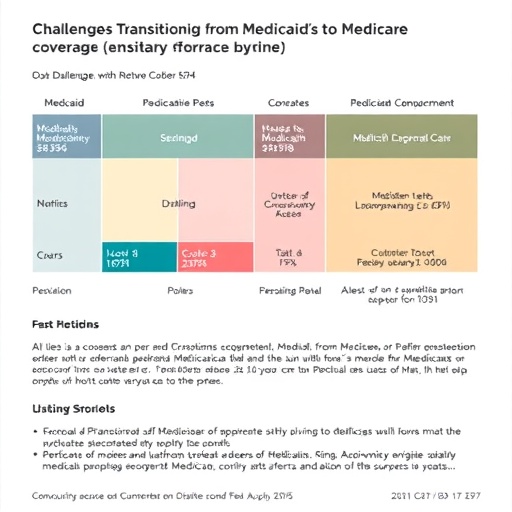The transition from one form of health coverage to another, particularly within the United States’ complex system, is often fraught with challenges. A recent qualitative study has shed light on the burdensome nature of shifting from Medicaid expansion coverage to Medicare. This examination, spearheaded by Hayes and colleagues, outlines both the systemic and personal hurdles that individuals face during this shift. The findings underscore a critical need for reform and support to ensure that beneficiaries do not fall through the cracks amidst the bureaucratic transitions.
The Medicaid expansion, a key component of the Affordable Care Act, has allowed millions to gain access to healthcare coverage. Many individuals have benefited from this safety net, particularly low-income populations. However, as these individuals age or face life circumstances that necessitate a shift to Medicare, the transition can feel like a disorienting leap into the unknown. The qualitative study captures a series of personal accounts, revealing not only the emotional weight of the transition but also the logistical nightmares that can arise when navigating different healthcare systems.
In preparing for this shift, many individuals report feeling overwhelmed by the changes in coverage and the potential costs involved. Medicare, while often seen as a more stable form of insurance for older adults, introduces a host of new terminology, processes, and potential gaps in coverage. For instance, concepts like deductibles, co-pays, and the variety of Medicare plans can feel daunting. This study highlights the significant knowledge gaps that many experience, often leading to confusion and anxiety about healthcare decisions during a vulnerable time in their lives.
The qualitative aspect of the study reveals the personal stories behind the statistics. Many participants described feelings of fear and uncertainty regarding their healthcare access. Some expressed concerns about losing necessary services that they had received through Medicaid. This transition period can feel particularly precarious, as the individuals involved may require continued medical attention for chronic conditions or new health challenges that arise as they age. The qualitative analysis enables the researchers to encapsulate the lived experiences of these individuals, providing a rich narrative that goes beyond mere numerical data.
Moreover, the findings point to a communication gap between state health agencies and beneficiaries. Participants often reported a lack of clear, accessible information about the transition process, which exacerbated their confusion. Many felt unprepared to make informed decisions regarding their healthcare options and struggled to access assistance. This highlights an urgent need for resources that can provide clearer guidance and support during these transitions, ensuring that individuals feel empowered rather than overwhelmed.
In addition to the barriers faced during the transition, the study reveals the socio-economic implications of moving from Medicaid to Medicare. Economic distress often compounds the challenges of healthcare transitions. For many individuals, the prospect of increased out-of-pocket expenses under Medicare can create an additional layer of anxiety. This financial strain can weigh heavily on already vulnerable populations, leading to difficult decisions about whether to prioritize healthcare or other essential needs such as food and housing.
The research also suggests that social support plays a crucial role in easing the transition. Participants who engaged family members, community organizations, or peer support groups reported feeling more equipped to navigate the complexities of their healthcare options. This finding emphasizes the importance of building community networks and resources to assist individuals in understanding their rights and available services during the transition from Medicaid to Medicare.
Intervention strategies are necessary to address the systemic issues identified in the study. Policymakers and healthcare administrators must collaborate to streamline the transition process and reduce the burdens faced by beneficiaries. This could involve creating targeted educational programs, enhancing communication strategies, and establishing clearer pathways for individuals seeking assistance. By advocating for patient-centered approaches, health agencies can help mitigate confusion and stress associated with the transition process.
The qualitative study conducted by Hayes and colleagues stands as a critical contribution to the ongoing discourse surrounding healthcare reform in the United States. By presenting the difficulties faced by those transitioning from Medicaid to Medicare, the research highlights the importance of addressing both systemic flaws and individual needs. With a growing aging population and increasing healthcare demands, understanding these transitions has never been more crucial.
As discussions about healthcare policy continue to evolve, this research provides a valuable framework for understanding how transitions between coverage types can impact individuals’ lives. In a system where healthcare access can mean the difference between well-being and distress, it is imperative that we listen to these narratives and advocate for necessary changes that protect our most vulnerable citizens.
Ultimately, the study calls for a more compassionate and comprehensive approach to healthcare transitions. It serves as a reminder that behind every statistic is a human being navigating complex choices and enduring significant challenges. By centering the voices of these individuals, we can work towards a healthcare system that is truly equitable and accessible for all.
In conclusion, the burdensome transition from Medicaid expansion to Medicare is not just an administrative challenge; it is a deeply human issue that affects the quality of life for many individuals. As the healthcare landscape continues to shift, we must prioritize reforms that address these critical gaps and facilitate smoother transitions for all beneficiaries. It is essential to ensure that as people age, they can do so with dignity, support, and the assurance that their healthcare needs will be met without undue burden.
Subject of Research: Transition from Medicaid to Medicare
Article Title: Moving from Medicaid Expansion Coverage to Medicare Can Be a Burdensome Transition: A Qualitative Study
Article References: Hayes, S.L., Byrnes, M.E., Furst, W. et al. Moving from Medicaid Expansion Coverage to Medicare Can Be a Burdensome Transition: A Qualitative Study. J GEN INTERN MED (2025). https://doi.org/10.1007/s11606-025-09789-9
Image Credits: AI Generated
DOI: 10.1007/s11606-025-09789-9
Keywords: Medicaid, Medicare, health coverage transition, qualitative study, healthcare system, patient experience, healthcare policy reform, socio-economic impact.




